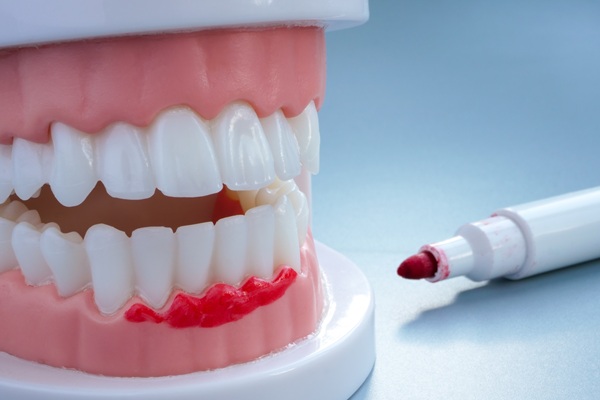Easy Tips to Prevent Gum Disease

Like tooth decay, gum disease is preventable. You can avoid serious oral health problems by improving a few habits and being more diligent about your dental care. Gum disease can affect people of all ages. It can also contribute to infections, tooth loss, and other concerns. Your dentist can help you avoid this condition and treat the disease if it starts to develop. It is important to pay attention to some basic prevention tips.
The effects of gum disease
Before understanding how to prevent gum disease, individuals should recognize what it can do to the body. Gum disease starts out as a more minor condition called gingivitis. This is when the gums become red, start to swell, and begin to bleed. If the patient does not address these issues, periodontitis can result. This more serious form of the disease causes the gums to shrink, exposing more of the tooth. This creates gaps where bacteria can hide.
Eventually, bone loss can occur, which can cause the teeth to become loose and fall out. The bacteria can cause infections in the mouth and throughout the body. If the bacteria get into the bloodstream, it can cause heart problems. Strokes and heart attacks can result.
Brush often
Dentists tell patients of all ages to brush their teeth regularly. People who brush at least twice a day are more likely to stay away from gum disease. Individuals should use a soft-bristled brush and fluoride-based toothpaste. It is effective to brush before bedtime and in the morning. Brushing after mealtime is important too. Brushing will prevent the buildup of plaque and removes food particles from the gumline and in between teeth.
Floss daily
It is common for dental patients to report to the dentist or hygienist that they do not floss often enough. Flossing every day will keep gums healthy. This habit will dislodge food and other debris from in between teeth. It keeps the gums from becoming inflamed and receding. Flossing will help individuals to avoid tartar buildup and the severe problems that can follow.
Make and keep dental appointments
Some people may not recognize gum disease. The dentist will have the knowledge and training to diagnose the condition. Semiannual dental checkups are a good opportunity for the dentist to examine the patient and look for signs of gingivitis or periodontitis. Not only will the hygienist clean the gums and teeth, but the dentist can offer advice on how to brush and floss more effectively. Consistently going to the dentist’s office will help the patient to stay on top of these good habits.
Strengthening your gums does not have to be difficult
The effects of gum disease can be severe. You can avoid these negative consequences by following a daily regimen of good oral hygiene. If you are not brushing and flossing every day, start today. Make sure you are going to the dentist’s office for a cleaning at least twice a year. Doing these things can significantly improve your oral health.
Request an appointment here: https://www.potomacwoodsfamilydentalcare.com or call Potomac Woods Family Dental Care at (301) 202-1553 for an appointment in our Rockville office.
Check out what others are saying about our dental services on Yelp: Gum Disease in Rockville, MD.
Related Posts
If your dentist has diagnosed you with gum disease, you should start making improvements to your oral hygiene right away. The faster you catch this condition, the more likely you are to overcome it. People who ignore the disease can find themselves with various oral health issues, including tooth loss. Eventually, the condition can affect…
When undergoing a dental appointment, patients can request an oral cancer screening to know if they are at risk of developing the condition. The screenings are meant to detect early signs of the condition before it reaches a more advanced stage.The 5-year survival rate is at about 50 percent, so it is highly vital to…
Using the right toothbrush is part of preventive dentistry. Your dental health is more secure if you have the right tool for cleaning your teeth and gums. An effective toothbrush can help you reach your dental health goals. If you want to know the basics of choosing the right toothbrush as part of preventive dentistry,…
Practicing preventive dentistry at home allows you to reap many benefits for your general health. Brushing and flossing every day is a basic way of keeping your mouth in good shape. Having healthy teeth and gums helps support your whole body’s health. If you want to find out why good everyday dental hygiene is important…


